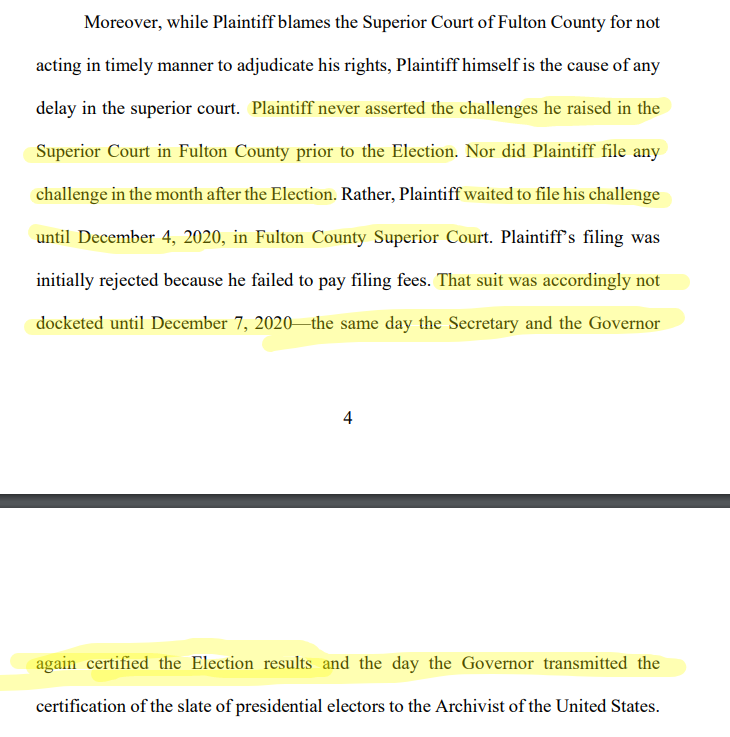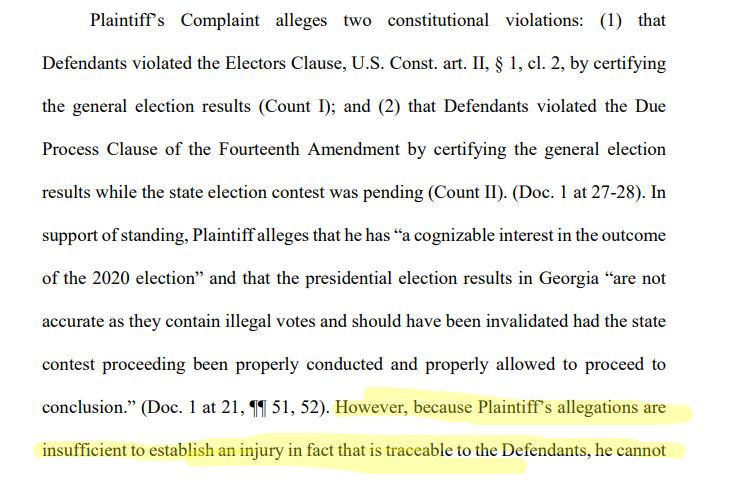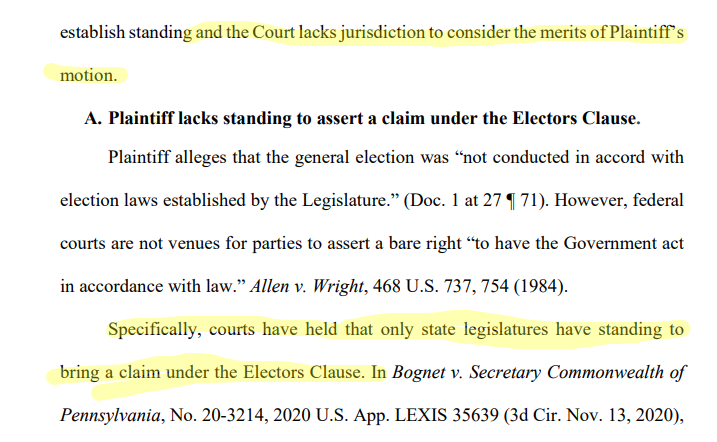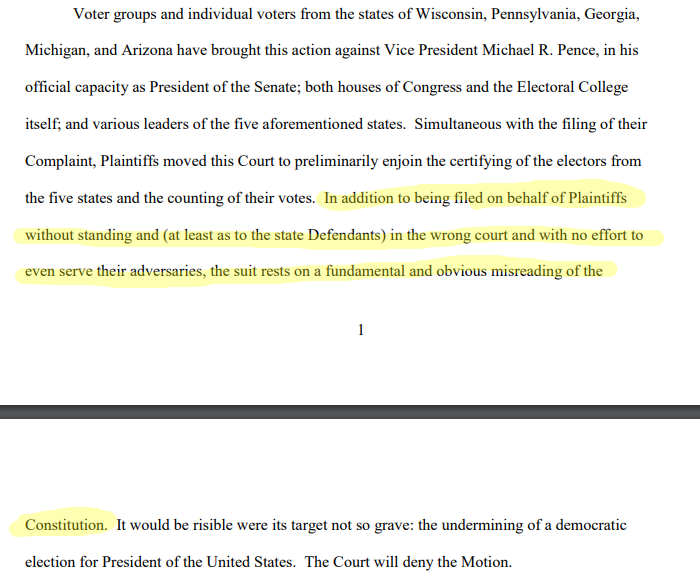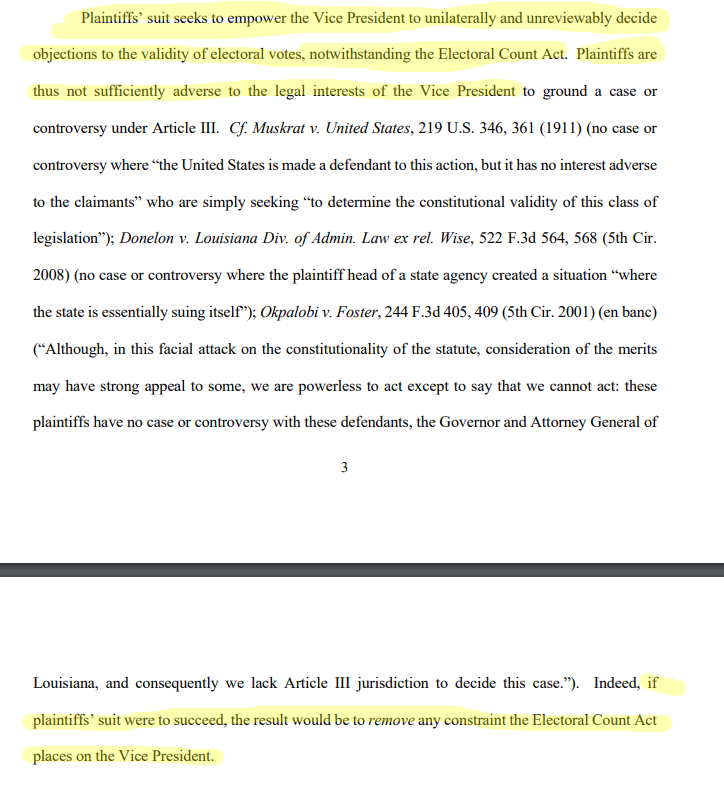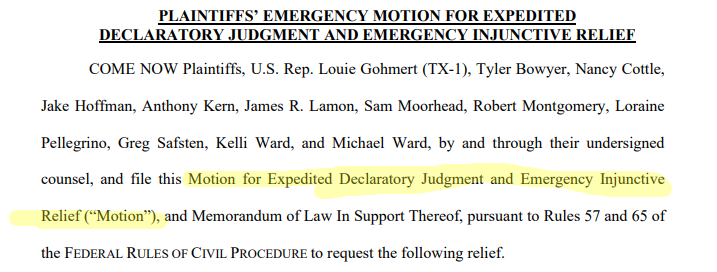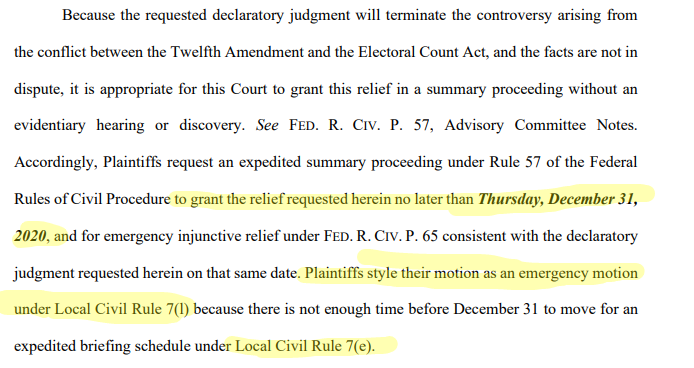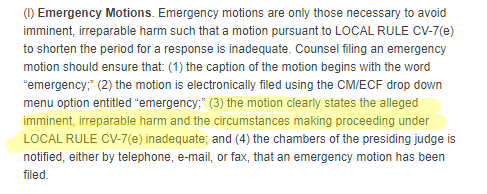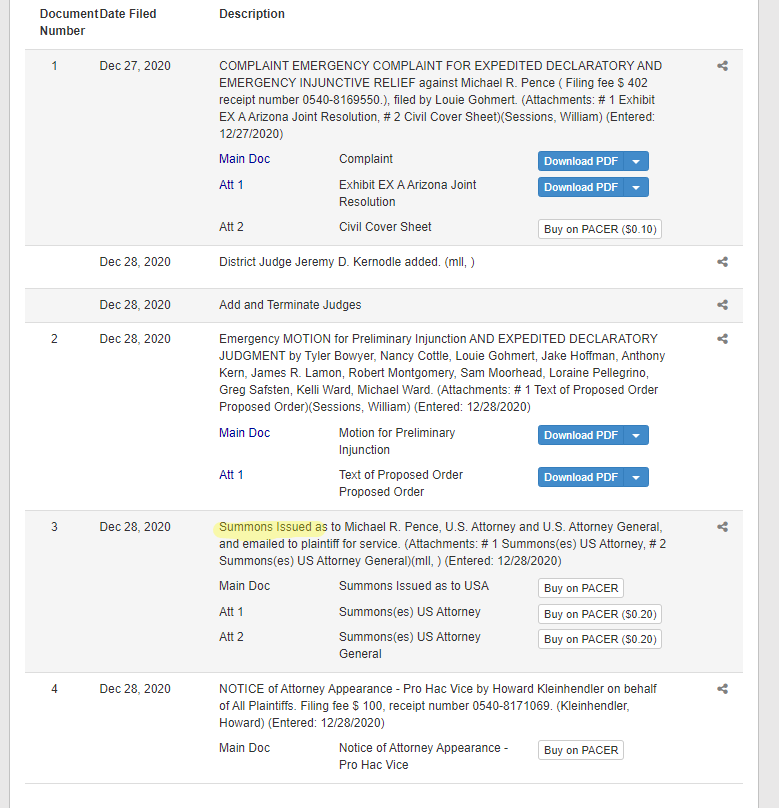
Raffensperger has filed his response to the new Trump case, on very short notice. @questauthority is livereading it here twitch.tv/questauthority
So I'll do a twitter thread
So I'll do a twitter thread
Let's start with the Table of Contents, which tells you which points they're going to hit. It's all the ones you would expect: the 5 reasons the court shouldn't bother hearing the case at all (standing, mootness, laches, sovereign immunity, abstention) plus losing anyway 
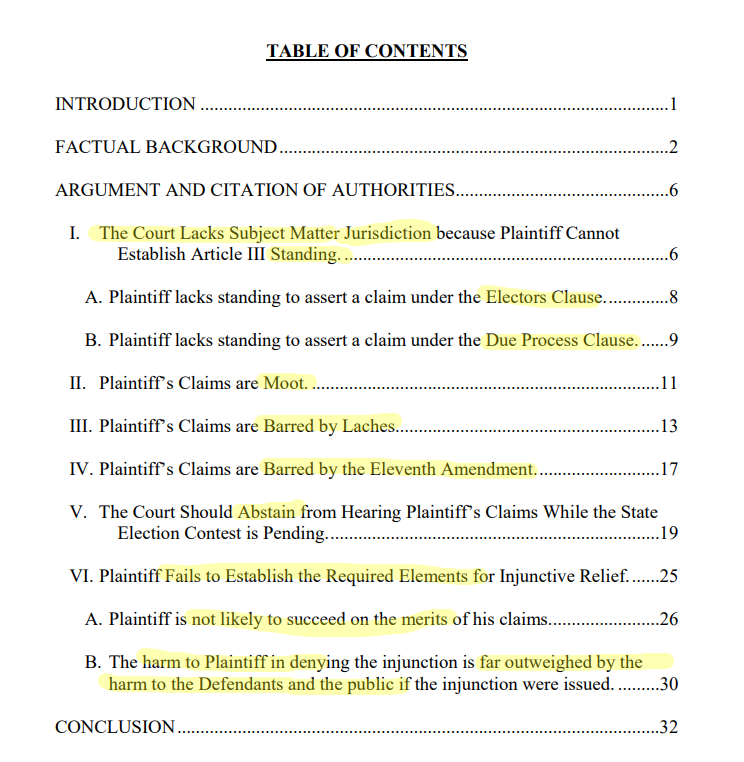
This is a nice start to the intro. We counted this stuff over and over. We've already certified repeatedly, appointed electors, sent in the slate, they voted already.
We. Are. Done. This is in Congress's hands now. So what are they doing in your court suing us??
We. Are. Done. This is in Congress's hands now. So what are they doing in your court suing us??
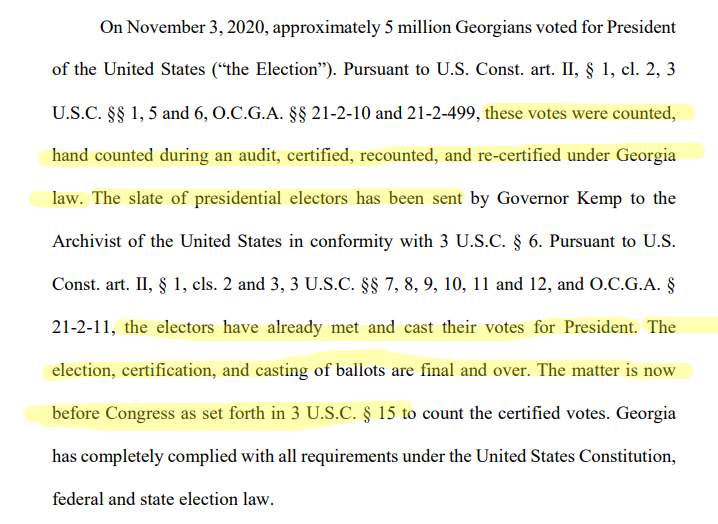
This is a good follow-up. Not only is it over, but they've tried to challenge all these things and lost over and over and over.
Trial on January 8 doesn't seem like a smart thing to rely on, though, given that the count in Congress is on 1/6
Trial on January 8 doesn't seem like a smart thing to rely on, though, given that the count in Congress is on 1/6
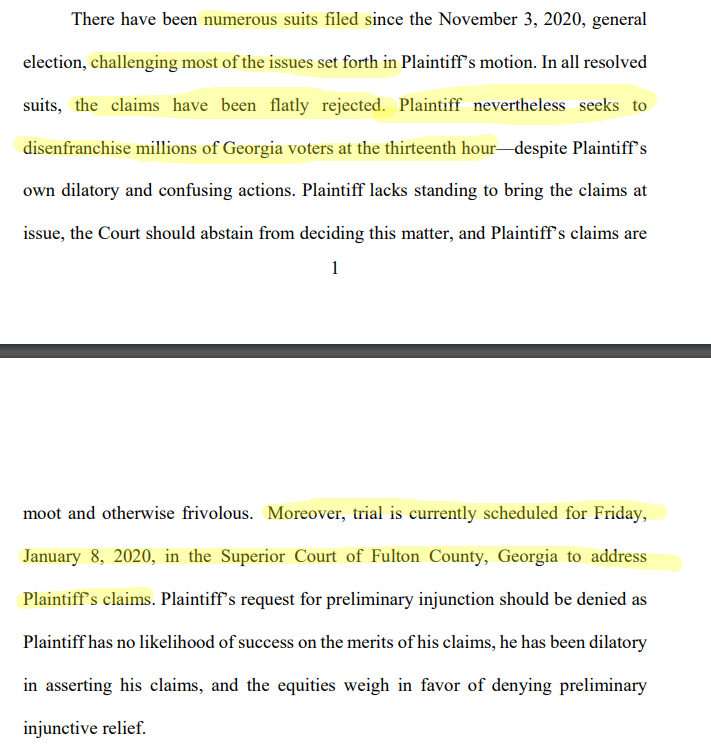
Also, Mike, come try to heckle. Just you try it
Then we get to the factual background. Won't torture you with all of it.
But this is a weird thing to show up in a statement of facts. Also, I question its accuracy.
But this is a weird thing to show up in a statement of facts. Also, I question its accuracy.
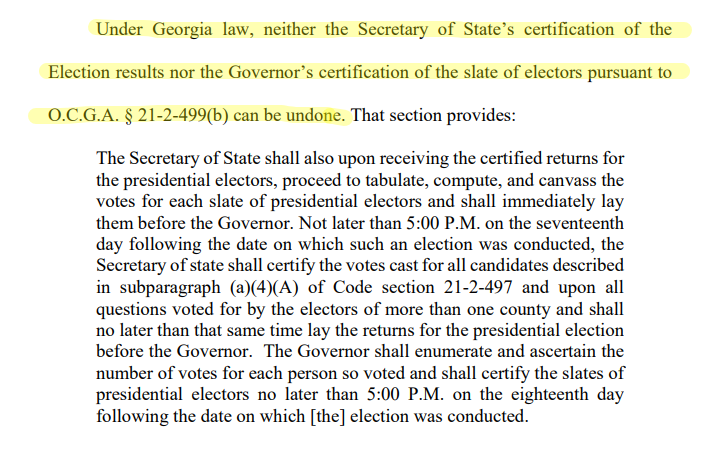
Georgia law provides for post-certification election challenges, which would be useless if the certification is irreversible. Same for the governor's certification of electors, since the law allows election challenges up to 5 days post certification of the results
Or perhaps not. This is an excellent point. It basically says "if you want to challenge the election results after those deadlines you can ask the court to STAY the certifications by showing a good reason for concern." 
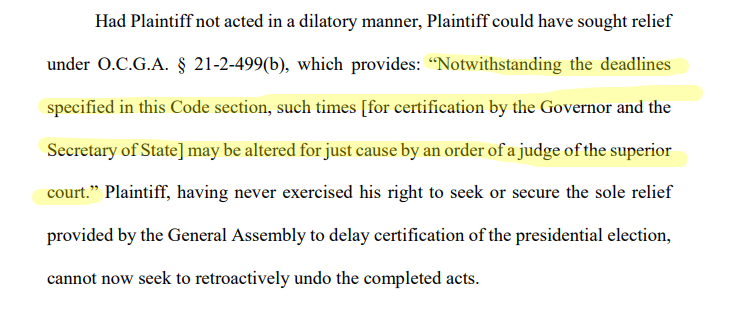
On the other hand, if that happens the deadline for the challenge is "five days after certification, which won't happen til after the challenge" which seems ... unworkable? So ... I don't know. Will be an interesting argument, and I see viable arguments either way
But yes, "Trump is responsible for the entire delay" is going to be a theme for this response, I'm guessing
So here's a nice paragraph walking the judge through the dick-and-foot-shooting procedural moves we discussed in the thread on Trump's filing; yeah, what we figured out from the Trump filing is exactly what happened: the idiots filed a notice of appeal that delayed the state case 
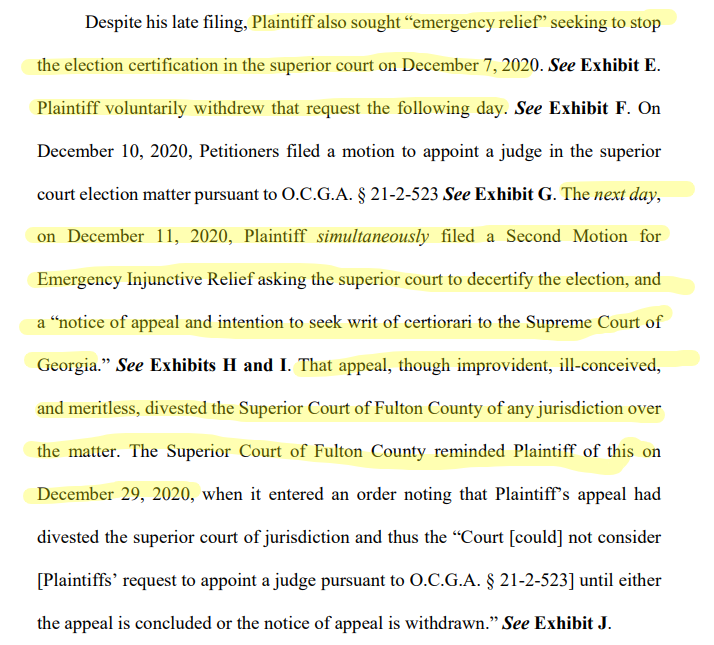
Oh, lol
After being tapped on the head by the judge with "hey, idiots, if you wanted me to do anything you need to withdraw the notice of appeal" they wasted another day before doing it, at which point the state court kicked into gear 
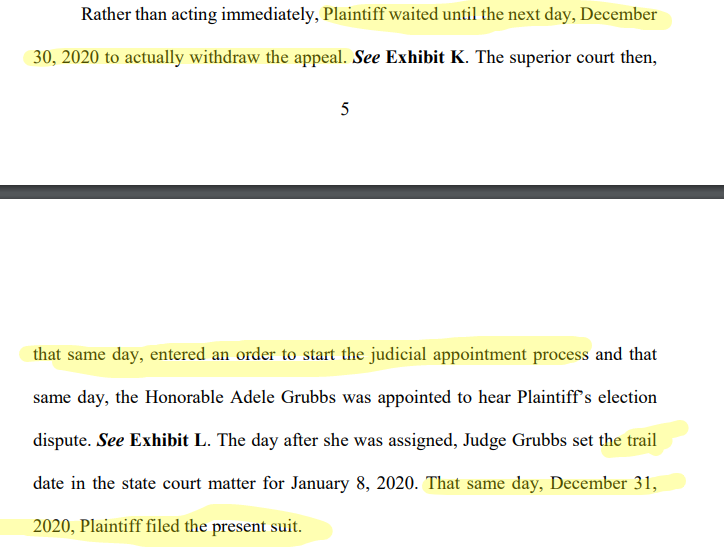
So, just to recap. Their ENTIRE theory of "the state court is treating us unfairly" is "they took too long to give us the ALJ we asked for". GA has just neatly pointed out that ALL of that delay - literally every second of it - was because of the Trump team.
Seriously. They filed 12/4, but got bounced for not paying their filing fee. They only really filed 12/7 (and btw, telling the federal judge that you filed 12/4 and the court delayed until 12/9, without mentioning that you screwed up the filing and didn't get on file for 3 days?)
They then waited another 3 days to ask the Court to do anything, and right when the Court did - in one fucking day, which is a land-speed record for state courts, in my experience - they filed a notice of appeal that stopped the court from doing anything else.
And then LEFT THAT IN PLACE WITHOUT DOING ANYTHING for weeks until the court said "uh, hey, guys, if you want us to act ..."
They then waited ANOTHER day to withdraw it, and the Court again IMMEDIATELY started giving them what they asked for.
They then waited ANOTHER day to withdraw it, and the Court again IMMEDIATELY started giving them what they asked for.
The VERY NEXT DAY they filed this case in Federal Court arguing that the state had deprived them of due process by not handling their case quickly enough.
Good God.
Good God.
"Your honor, we stopped the court from acting quickly enough, so that's a due process violation" is ... um ... *an* argument, I guess?
Speaking of which, Raffensperger is on to the argument.
Oh! Meant to mention one screenshot back: typing "trail" when you meant to say "trial" is the type of thing that will happen when you're given less than 12 hours notice to file a brief like this.
Oh! Meant to mention one screenshot back: typing "trail" when you meant to say "trial" is the type of thing that will happen when you're given less than 12 hours notice to file a brief like this.
Given the time constraints, this brief is particularly impressive work, even with them able to crib substantive bits and pieces of it from other filings
"The Eleventh Circuit - you know, the guys who will review any ruling you make and whose precedent you are absolutely REQUIRED to follow - just held you can't consider cases like this" is a particularly strong start to any argument section 
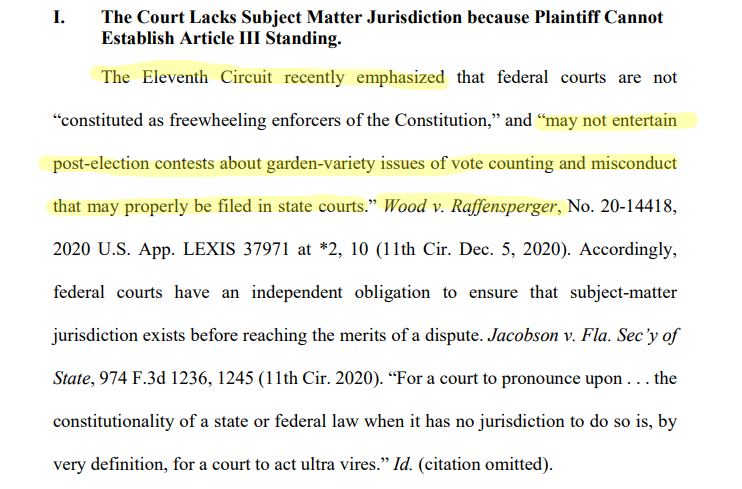
On to the nuts and bolts of the standing argument:
1) You're suing the wrong people, or
1) You're suing the wrong people, or
I will say that it's kind of weird that the intro focused on traceability ("who hurt you?"), then the next point was "you're not the legislature" and now we're back to "who hurt you" on the due process claim - but those are the types of structural issues deadlines can cause 
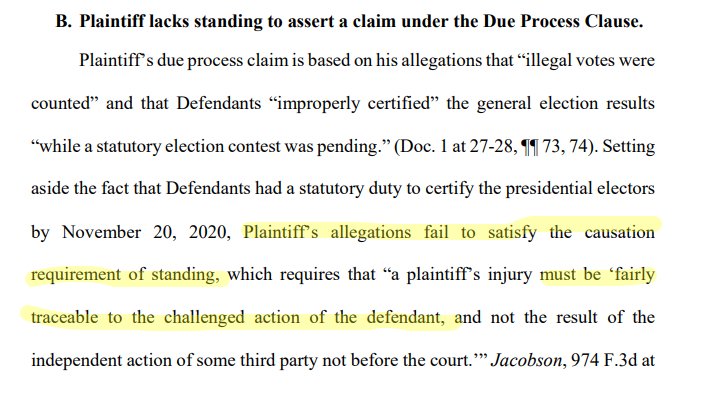
That said, I don't find this to be a particularly strong argument; county officials may have validated the votes in question but the Secretary of State did a risk-limiting audit of the count after the fact and before certifying. 
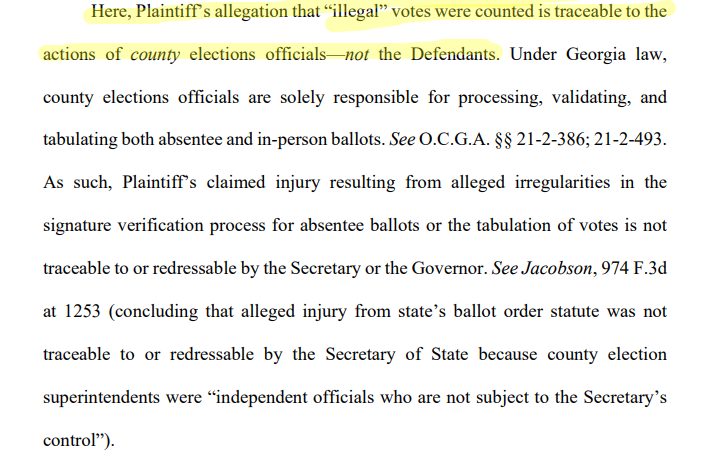
Then again, the Eleventh Circuit seems to have liked this argument, in which case I'm dead wrong (though there was no audit for the Senate races, so ... maybe?). BRB, gonna go read that opinion 
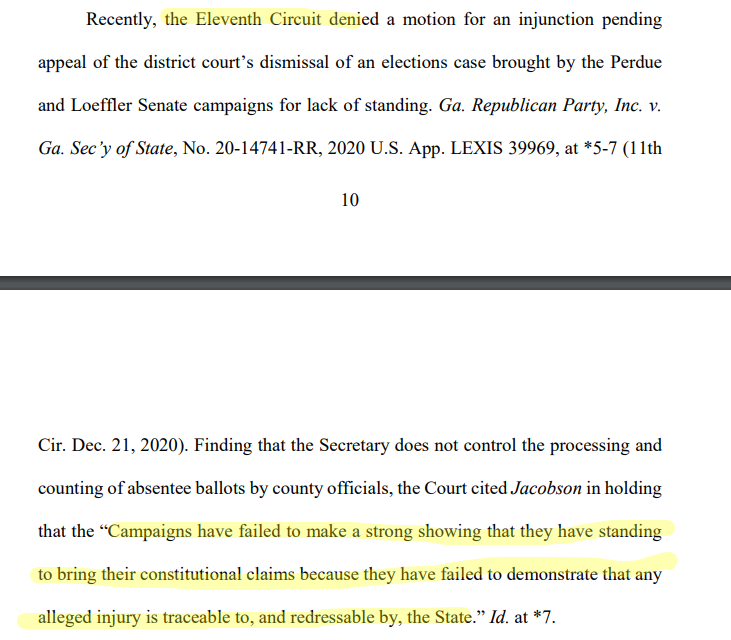
OK, after looking at it, I don't think this case controls. The issue there was a challenge to signature matching on absentee ballots, which by statute is done only by the county officials. This is a challenge to whether the election was certifiable as a whole, which seems to be 
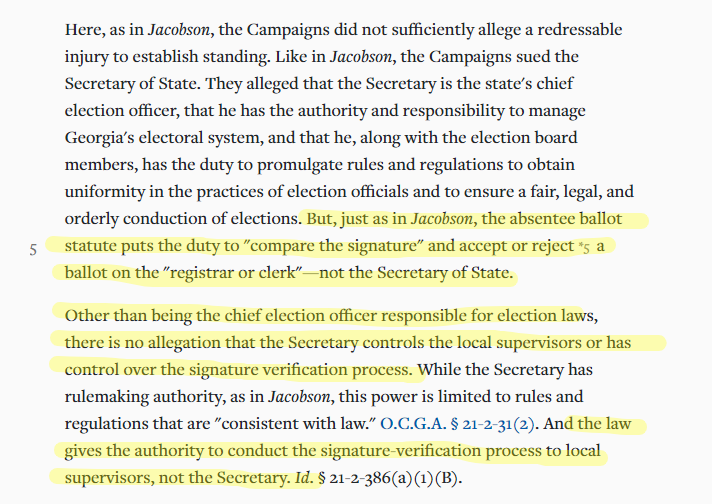
squarely within the Secretary's authority. Unlike the Perdue case, Trump isn't asking that anyone be directed to re-check signatures (which would be county officials). He's asking for the *Secretary's* signature to be rescinded.
It's not a slam dunk either way but I wouldn't be surprised if the judge isn't persuaded by this standing argument
This, on the other hand, is self-evidently true. Neither the *Secretary of State* nor the *Governor* had anything at all to do with the court delays - which were all caused by Trump's own lawyers. And it's not like they can order the state court to move faster 
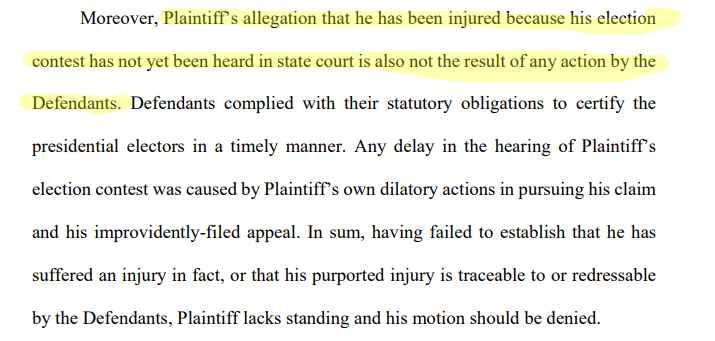
That said, the primary point of that argument by Trump is to give the court reason to say "I'll take this on even though it's already in front of another court, because that court is screwing you with delay"
It won't work, for multiple reasons. But that isn't a standing issue
It won't work, for multiple reasons. But that isn't a standing issue
(BTW, I expect we'll see this issue addressed more directly in the abstention section, so we'll get there, but briefly, the path to review of state court delay is in state court, not federal court)
This is a strong argument. Not only has the Eleventh Circuit already held that you can't turn back time, you can't find a way, but also there's a Bush v. Gore problem: State law provides for certification and voting deadlines and a way to delay it, and no way to "decertify" 


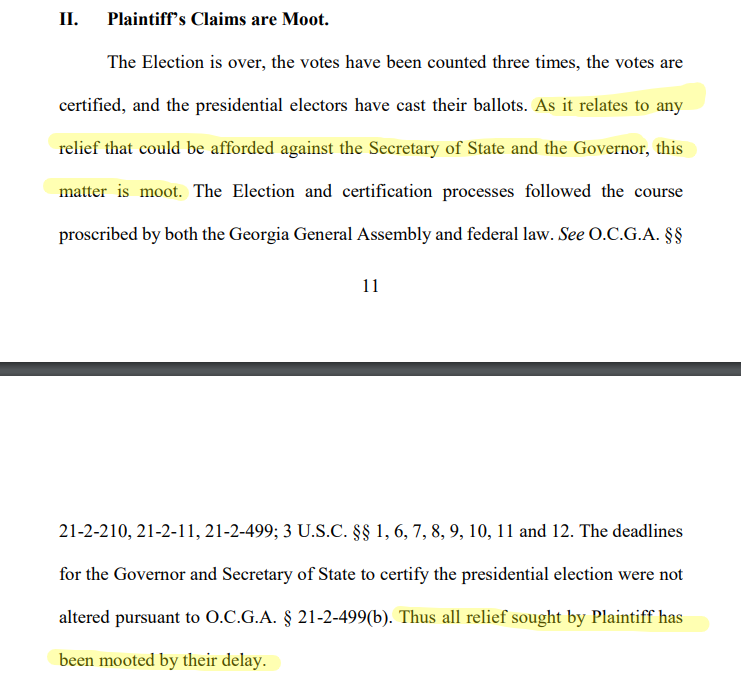
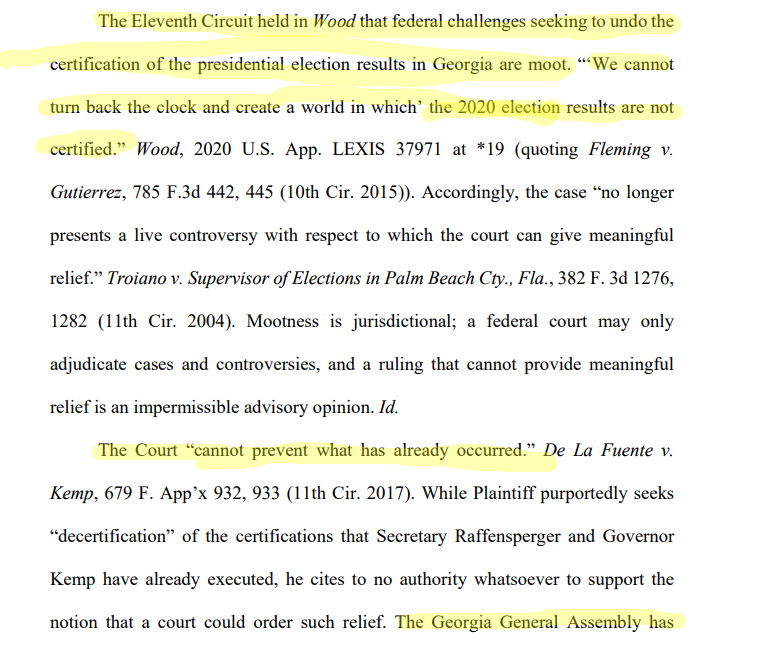
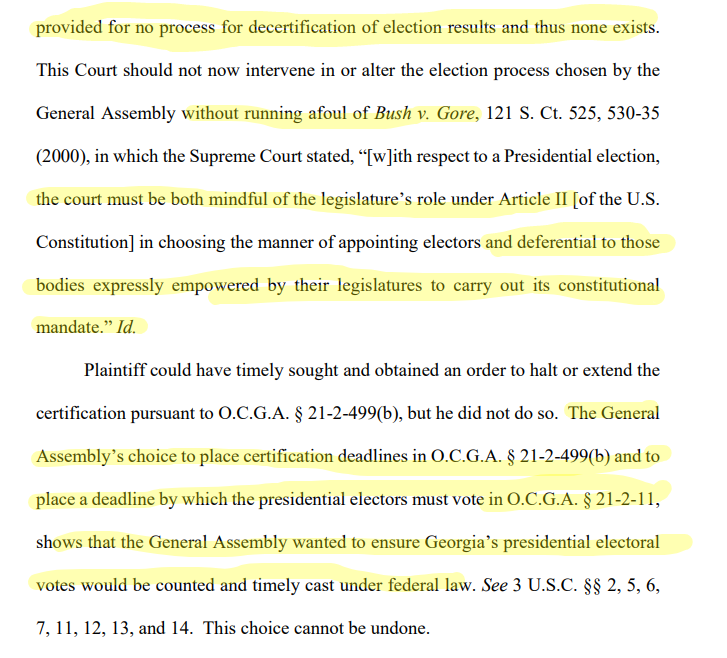
It's not for Federal courts to invent new ways to vindicate supposed state election rights; the legislature provided a path for election challenges, and this is very very much "you snooze, you lose" - especially given all the laches issues we're about to get to.
After all, if you could have challenged the signature match settlement, and the mailing of ballots and applications, among other things, well before the certification deadlines, why should the court invent a new form of relief ("decertification") just because you delayed?
Here's that laches argument, and it's very well done. Clear and - with respect to the "this was happening months ago" stuff - very very hard to argue against. 

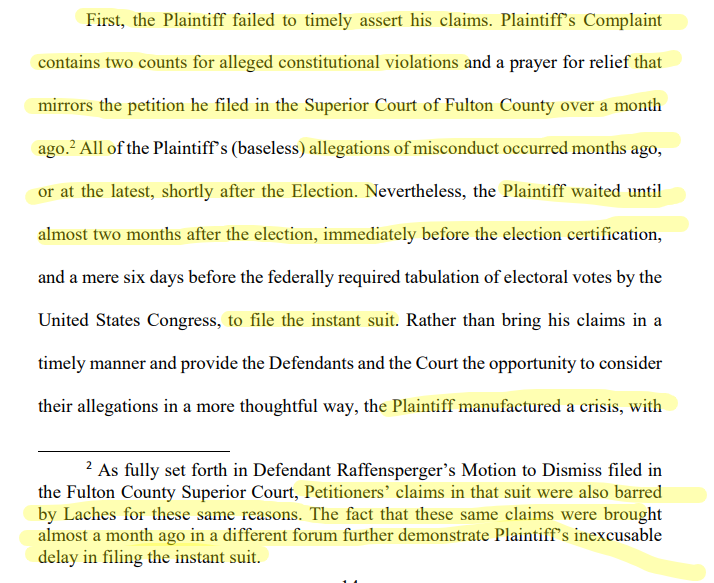
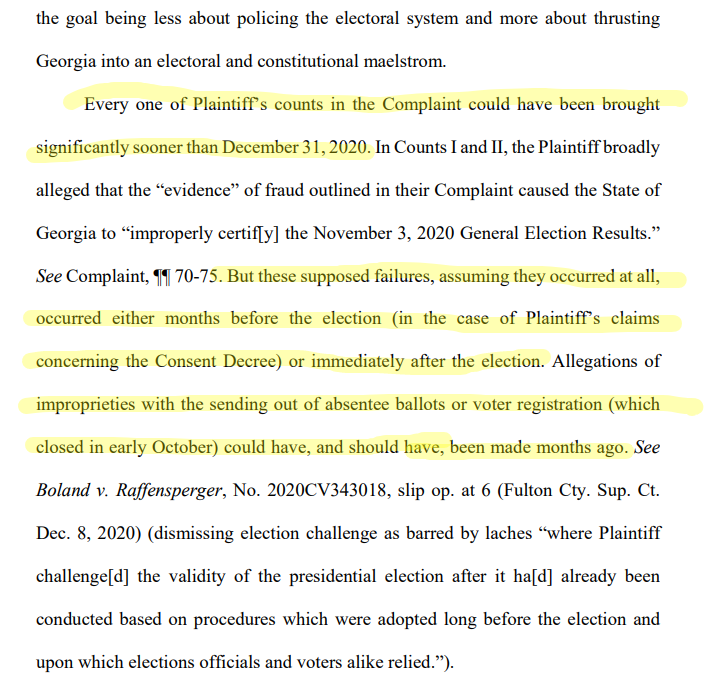
This is also very nice, but ideally I'd like to see some sort of citation for the claim that Trump knew about the supposedly illegal votes "shortly after the election" 

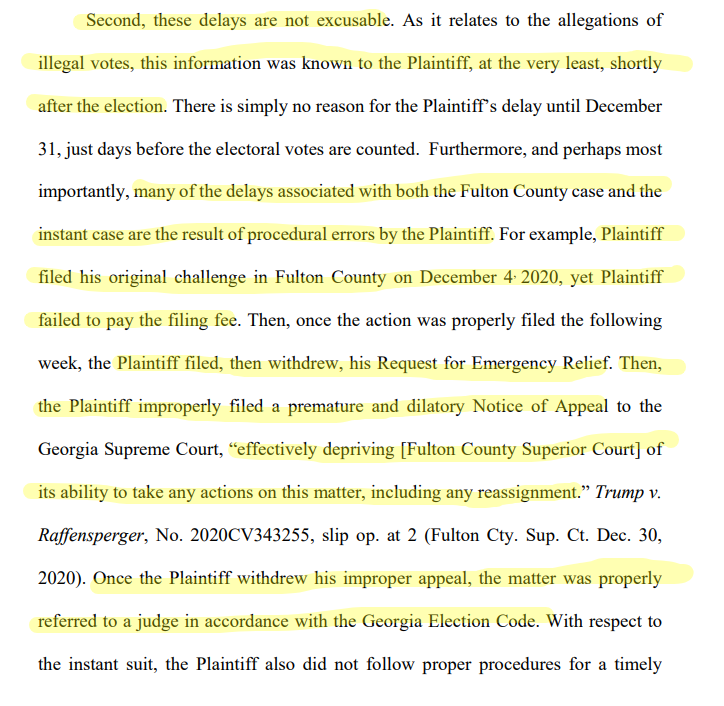
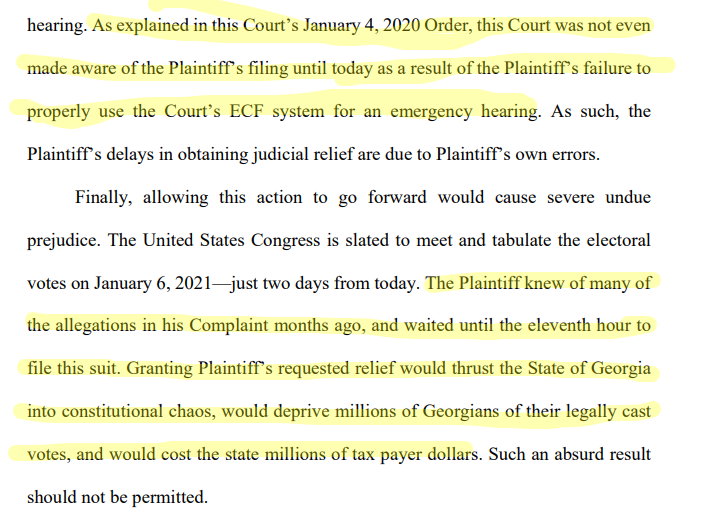
Also, the continued shots at the incompetence of Trump's lawyers really soothes the soul. Fucking up basic emergency filing procedures in, well, an emergency, is pretty terrible.
Also, I'm guessing that last highlight previews what we'll see in the "balance of the harms" section
Also, I'm guessing that last highlight previews what we'll see in the "balance of the harms" section
Next we have the Sovereign Immunity stuff we've seen before and that the plaintiffs just decided to ignore. You CANNOT sue a state in federal court, arguing that it did something that harmed you in the past and you want that harm fixed 


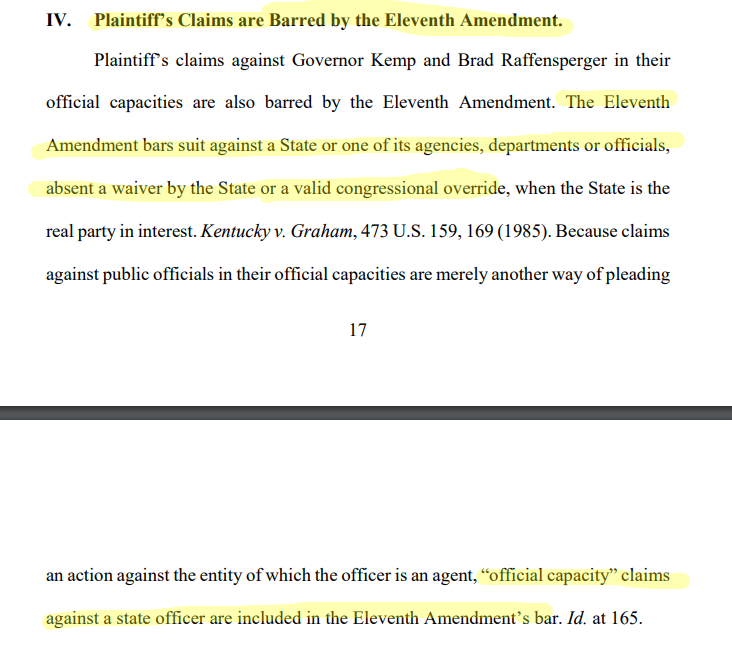
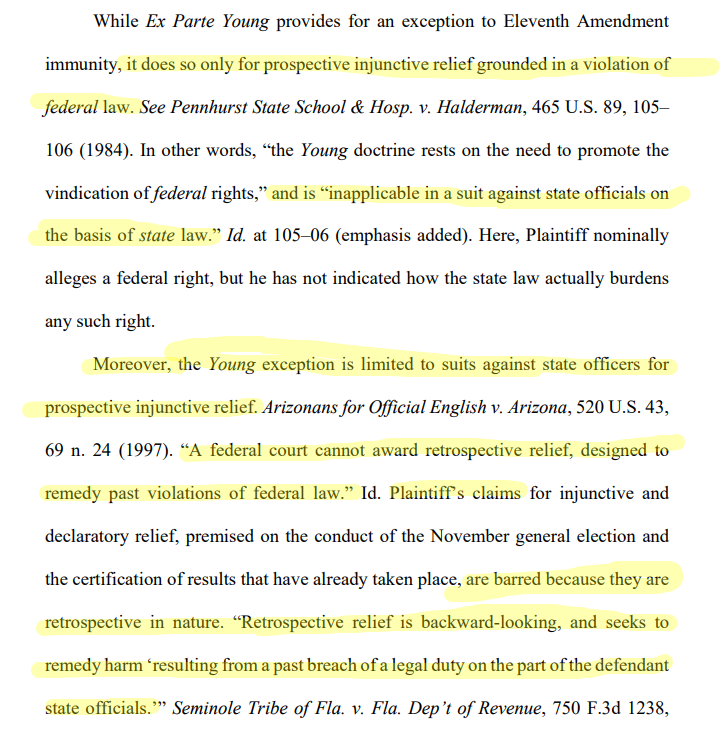
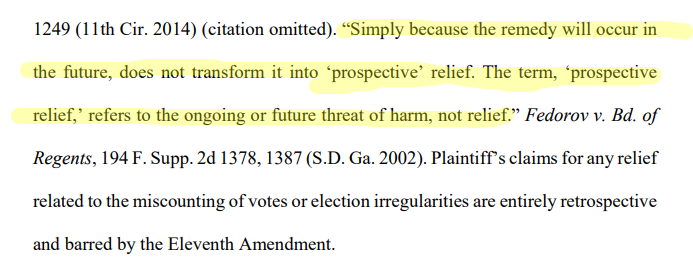
There are exceptions to that, like when the State says "you can sue us for this" or when Congress says "yeah, you can sue them for this", or when you're asking the state to "please stop violating my rights". But not "fix the past violation"
For example (and ignoring any waiver issues), take a state that is refusing to let a Muslim prisoner pray or provide a Jewish prisoner kosher food. They can raise first amendment claims in federal court asking for an order telling the State "stop it. Let him pray/eat"
But if not for Congress passing a civil rights law that expressly allowed for suing states over those violations, they wouldn't have been able to get damages for past violations
Here, Trump isn't asking to remedy an ongoing "violation" of his rights. He's asking the Court to fix what he claims was a *past* violation. That's not going to fly in Federal court
OK, I'm actually exhausted so I'll stop here, and we can cover abstention and the merits of the request for injunctive relief after I get some sleep.
Night, all
Night, all
Good morning. Let's talk abstention. Reminder, abstention is the doctrine that lets Federal courts say
So, here's the core of Georgia's abstention argument: Federalism (some things are state issues, some are federal, and this is a state issue), Pullman abstention (state courts, not federal courts, get first crack at whether state law is constitutional), and 



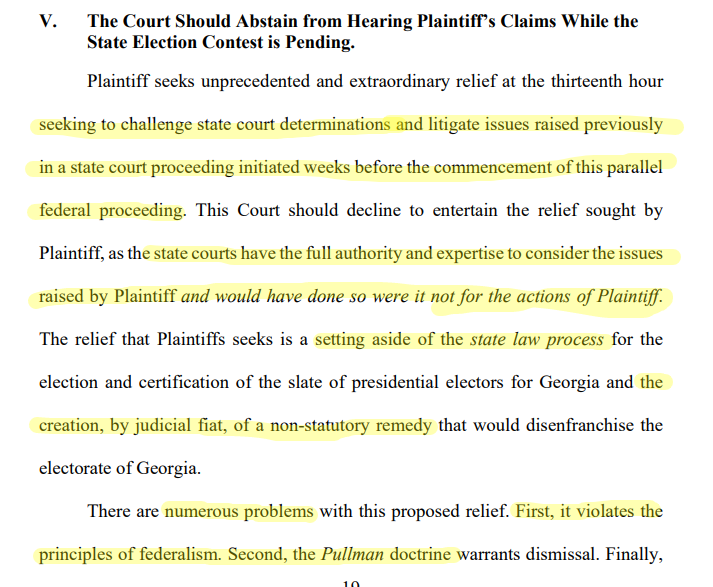
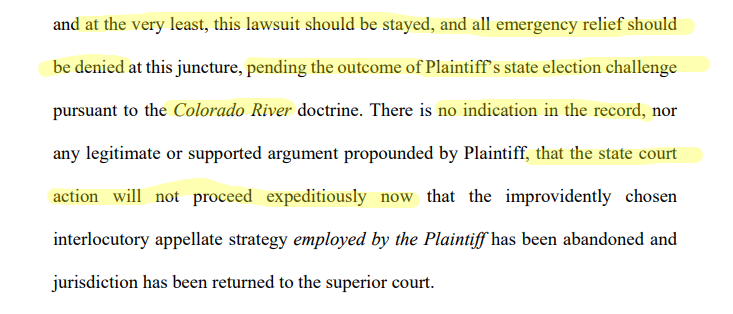
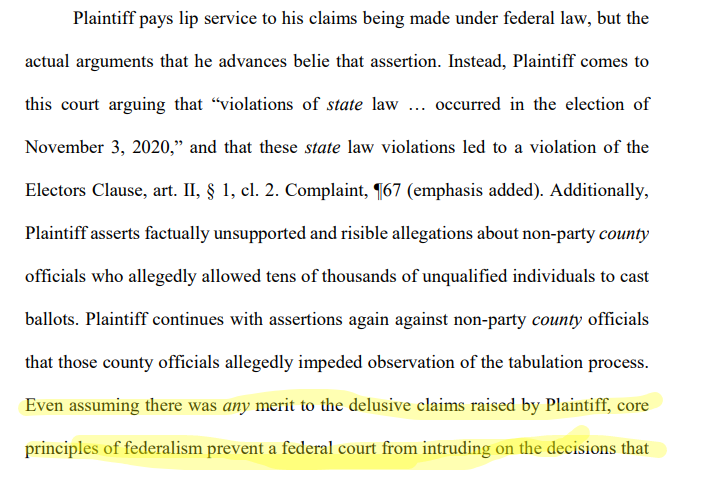

Colorado River abstention (federal courts shouldn't step in where there's parallel litigation in the state courts on the same issues)
They start with Federalism, which is a HUGE issue in all of these cases. The Constitution says STATES get to appoint electors in the manner STATE LEGISLATURES choose.
This is a core state power, even if it's one with national impact, and the Federal government should have very very little to say about it. It's fair to have a constitutional overlay of federal principles states need to be bound by - like who gets the vote if there's a vote, or
nondiscrimination, etc. It's a spectrum. But when you're getting into fine-grained parsing of whether state law was actually followed in a particular election, you are (IMHO) firmly in the "this is a State issue the federal gov't should stay out of" end of the spectrum
This is really well done. Not only does it highlight the distinction between "Manner" of choosing electors ("statewide election") and the particular processes used to implement the manner, but it emphasizes that the legislature delegated that authority by statute 
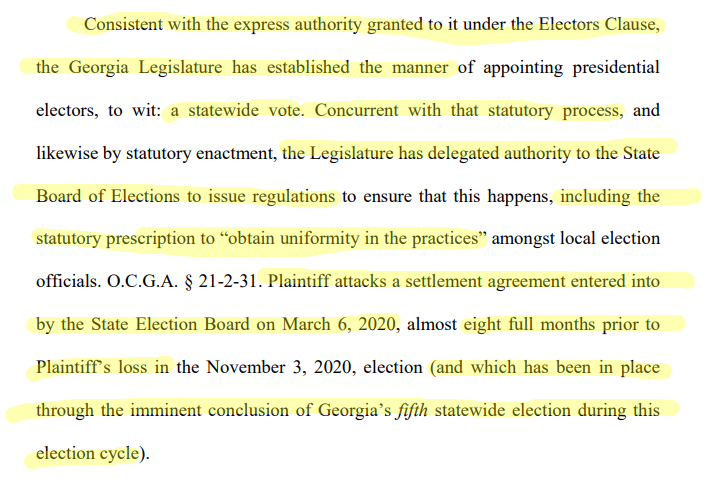
So even if there was any argument that the "Manner" authorized by the constitution includes "specific election regulations", the Legislature handed that role over to the State Election Board, which it can do. Plus ordered the Board to "obtain uniformity" which is what the
Settlement Agreement Trump keeps whining about (but didn't challenge until he lost) does.
That's a LOT of punch for a short paragraph
That's a LOT of punch for a short paragraph
Same here. This isn't just a general federalism issue. Congress, in the Electoral Count Act, announced (and put into play) a deliberate policy of deferring to state-law processes for resolving election challenges. Trump is asking the Court to disregard that. 
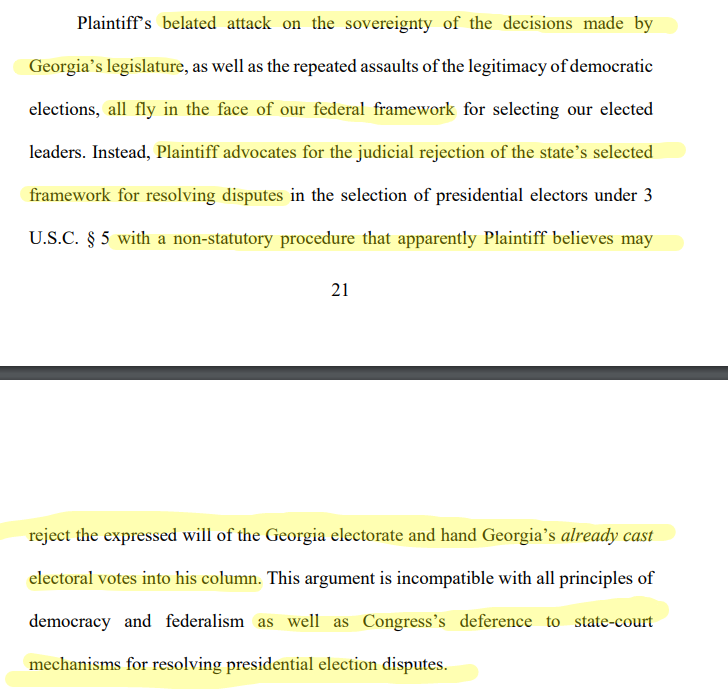
And the capper to this argument, tying it all together. "Usurp" is a particularly strong and appropriate word, especially when paired with "sovereign" - very direct "this is NOT your job and you'd be way past your authority to say it was" 
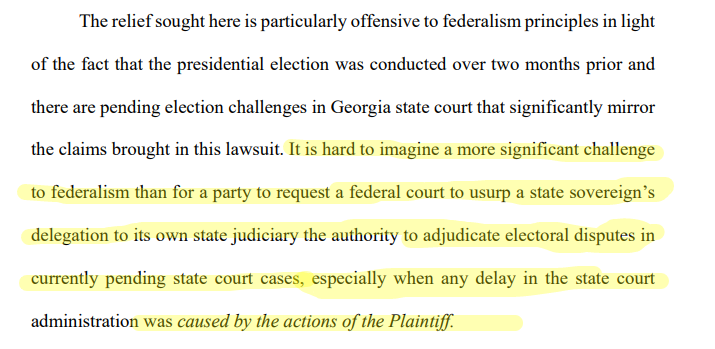
That segues nicely into the discussion of Pullman abstention. Basically, "that's why if the supposed Constitutional question depends on whether how we ran the election complied with GA state law, the Federal court has no business answering it" 



Also, "woefully unsupported rambling"
And then Colorado River. IIRC, it's unusual when the "parallel litigation" justifying abstention has the same plaintiff suing in both cases. 

Judges DO NOT like forum shopping and a plaintiff filing a case in state court and then saying "never mind, I'll try federal" isn't going to get much sympathy - especially when they are actively trying to litigate the same issues in BOTH places
And, the application of the doctrine to the facts: there's a real risk of inconsistent results or this court dealing with one part of a whole issue and the state court dealing with another, because these are state questions 



The one fly in this ointment is the state court setting the trial for 1/8, after the 1/6 electoral count in Congress. They're doing a good job of saying "Trump can't complain about that when he's the one who hired the circus clowns off the street corner as his litigation team".
But it's entirely possible a federal judge will look at that and say "yeah, that's their fault. But the outcome, now, is that the state court won't actually review these important issues until they become moot anyway, so I can't defer to them"
And, frankly, I think that's the right answer here. Yes, it's a state issue. Yes, the delays are the Trump team's fault. But if "defer to the state court" means the whole thing gets mooted and NO court hears the issue, that's not deference.
There are other reasons the Court could (and should) kick this without regard to the merits (laches, immunity, etc), PLUS they lose on the merits, but I don't think abstention *should* be one of them.
It may be, but if so I'd disagree with that ruling, to that limited extent
It may be, but if so I'd disagree with that ruling, to that limited extent
That presumption is incredibly important on a motion like this. A presumption basically means "until you prove it's false, the Court MUST assume it's true." So let's look at what the Court must assume is true here until *proven* otherwise:
1) The count is accurate. The Trump campaign doesn't just get to say "we think there were problems with the count, votes were flipped, we see weird statistical patterns" - they have to *prove* it happened
2) Registered voters are qualified voters. The campaign doesn't just get to say "look, we compared names against a national database and we think X number of voters were illegal". They have to prove, VOTER BY VOTER and with evidence that their data is about each specific voter...
that PARTICULAR voters who were registered were ineligible. They have not done that. They haven't even tried to do that. And if you remember back to the thread on their complaint, they ADMITTED that (remember the footnote that said "the SOS has better data than we do"?)
3) Officials did their job correctly. Trump can't just say "we don't think signature match was done correctly". They have to actually show, with evidence of specific mismatches, that it wasn't.
Seriously, let's break this into pieces. Part 1: This isn't just state law saying you can't do this, it's Federal law. Bush v. Gore said voting and having your vote counted is a fundamental right (where a state chooses to have elections). You can't just disenfranchise GA
Part 2: Long and thorough debunking of the Trump campaign's specific claims, with citation to evidence. I'm going to want to read those exhibits soon, I have a feeling they'll be fun
Part 3: A Daubert motion - which is a motion saying to the Court "you can't consider evidence from the other side's experts because either they lack the necessary expertise to provide testimony, or what they did isn't valid"
For example, if you wanted to have me testify about biosimilars or statistics, I'd get excluded as lacking relevant expertise. But even if you got an actual statistical expert to testify on statistics, if their testimony in a particular case isn't based on valid data, or is
based on pure speculation, that will get tossed out too.
"Throwing shit at the wall and howling really loudly may work for some monkeys, but it's not a winning legal strategy" 

Now this is a really smart litigation decision. One of the factors in getting an injunction is "irreparable harm" - that if you don't get an injunction, you're going to be hurt in ways you can't fix later. A more aggressive defendant might have argued Trump can't show that since 



even if he somehow steals GA's 16 votes, he would still lose (290-248). But that would just open up arguments about what's happening in other states, so they're leaving it alone and pointing out that even if so, "Trump losing the election even if the court later finds he should
have won" is less bad than "Georgia's electoral votes being tossed even if the Court later finds that Trump loses this case on the merits"
One person not getting the Presidency is *infinitely* less bad than disenfranchising millions
One person not getting the Presidency is *infinitely* less bad than disenfranchising millions
And this is a strong conclusion to the brief: we're not just saying that, the Eleventh Circuit, this court, and other courts have said as much, too. We win. 



Seriously - this is an incredibly well-written brief on a very tight timeline. My hat's off to the attorneys who handled it 



• • •
Missing some Tweet in this thread? You can try to
force a refresh
